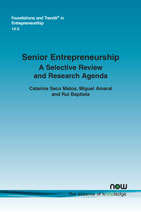Senior Entrepreneurship: A Selective Review and a Research Agenda
By Catarina Seco Matos, Instituto Superior Técnico, Universidade de Lisboa, Portugal, catarinasecomatos@tecnico.ulisboa.pt | Miguel Amaral, Instituto Superior Técnico, Universidade de Lisboa, Portugal, miguel.amaral@tecnico.ulisboa.pt | Rui Baptista, Instituto Superior Técnico, Universidade de Lisboa, Portugal, rui.baptista@tecnico.ulisboa.pt
Abstract
Scholarly interest in entrepreneurial activity by older members of society has been rising, reflected in the growing tally of publications about senior entrepreneurship as a distinct form of entrepreneurship
Our goal is to review and communicate the key conceptual approaches and empirical findings about senior entrepreneurs’ characteristics and behaviors, and to propose a research agenda. We analyze the literature by focusing on two research questions.
- i. What determines senior entrepreneurship?
- ii. What determines the performance of senior entrepreneurs?
Although senior entrepreneurs are not a homogeneous group, they are: more likely driven by non-pecuniary motivations than pecuniary ones; mostly male, married, and with high levels of education attainment. In general, senior entrepreneurs have previous entrepreneurial experience and display high levels of self-efficacy. A shift to self-employment later in life often leads to positive changes on individuals’ quality of life, but negative impacts on income.
Existing research is mostly based on data collected to assess entrepreneurs in general and not designed to analyze variables of specific interest for senior subjects. Future research should seek to develop primary data focusing on the relationship between quality of life and performance outcomes, and entrepreneurial activity’s impact on active ageing. Senior entrepreneurship needs to be examined through multidisciplinary lenses including psychology, gerontology, economics, and sociology.
Senior Entrepreneurship: A Selective Review and a Research Agenda
Senior Entrepreneurship reviews the most relevant research output on self-employment and entrepreneurship of older individuals and aims to contribute to the future development of novel theoretical and empirical approaches explaining self-employment and entrepreneurship of older individuals, bridging concepts from different fields, such as psychology, gerontology, economics, and sociology. It discusses the profiles of the senior entrepreneurs and the potential contribution of senior entrepreneurship to create social wellbeing and economic value by surveying theoretical and empirical work in different fields.
Senior Entrepreneurship is guided by two questions: What determines senior entrepreneurship? And what determines the performance of senior entrepreneurs? This research aims to shed light on how entrepreneurship might be shaped by the life stage of the individual. In this context, the present study contributes by reviewing previous literature and contributing to deepen our understanding of the significance older age might have on entrepreneurial skills and is the first encompassing and systematic literature review specifically focused on senior entrepreneurship.
Section 2 presents and discussed the theoretical approaches to senior entrepreneurship. Section 3 introduces the literature search strategy, concepts adopted, and the approach applied to organize and analyze the articles reviewed. Section 4 reviews the results of the literature survey. In exploring the research work surveyed, the authors first discuss the concepts of senior entrepreneurship adopted by the studies and then the methods applied. Following that, theoretical developments that are specific to the phenomenon of senior entrepreneurship are examined and the empirical findings of previous studies are presented. Section 5 discusses the survey’s results and potential future developments of research in the topic and Section 6 provides the conclusions.
